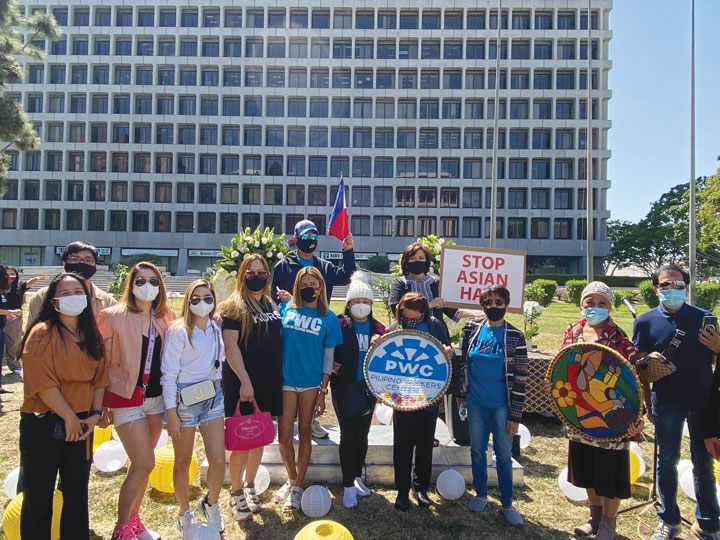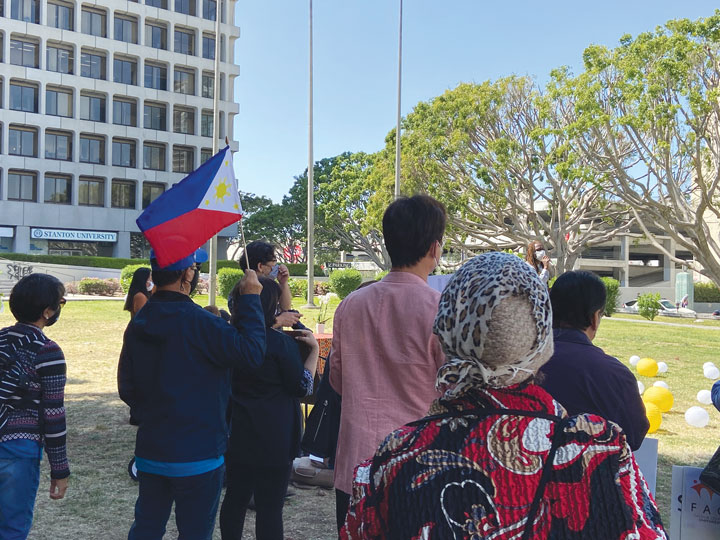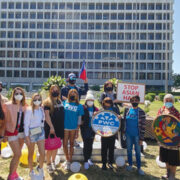
FOR Myrla Baldonado, daily walks outside have provided some solace during the pandemic lockdown.
But in addition to being vigilant about COVID-19 every time she steps out of her door, she is hyper-aware of her surroundings, knowing that older Filipino Americans around her age have been targeted across the country.
“I need to get my exercise, but I’ve been torn between going out or just staying and moving around inside,” Baldonado, 67, a lead organizer at the Pilipino Workers Center in Los Angeles’ Historic Filipinotown, told the Asian Journal. “Now when I go out, I watch my back and look at each direction, and really make sure cars stop before crossing the street.”
Debra Romig, who also lives in Downtown LA, echoed Baldonado’s concerns, referencing the recent attack of Vilma Kari, a 65-year-old Filipina immigrant, who was seen on surveillance footage being kicked and stomped on her way to church in New York.
“That attack on a Filipina was so devastating to hear about. Going outside was a way to not be so bored staying inside. But I’m scared to go out now because you can’t help but think about what if it happens to you or your friends?” Romig, 65, told the Asian Journal.
Asian Americans are quick to point out that hate against the community is not a new occurrence, but recent violence like the March 16 shootings that killed eight people, including six women of Asian descent, has brought the issue to a national level.
“It doesn’t matter whether it’s the Chinese, Filipino or Vietnamese community, we’re all experiencing attacks,” Aquilina Soriano Versoza, executive director of the Pilipino Workers Center, told the Asian Journal. “But we have to know that is happening and we need to voice it out, so that means reporting it because if not, it remains invisible.”
Since the beginning of the pandemic, PWC has received reports of its members, who are predominantly domestic workers, being harassed at their workplace or being verbally assaulted and blamed for the virus while out in public.
The organization is encouraging their members to stick together as many of them walk or take public transportation to and from work.
“If you are able to, move collectively and not just by yourself as that’s a way to protect,” Soriano Versoza said. “We’re encouraging people to be connected and communicative with each other. There are programs like in Chinatown that have volunteers who can accompany elders or those who are vulnerable.”

Stop AAPI Hate, a national reporting center that began last spring, received 3,795 firsthand incidents of racism and discrimination from all 50 states and the District of Columbia between March 19, 2020 to February 28, 2021.
Based on that figure, 503 incidents took place in the first two months of 2021 alone.
While individuals of Chinese descent accounted for 42% of the reports, other groups like Filipinos (7.9%) have experienced hate too.
“We’re outraged because Asians are part of the community. Health care workers in the Filipino community are sticking their necks out to help with the public health situation, and yet we are the victims. Women are usually the first to be attacked,” Perla Santos, who leads the MOTHER Movement, told the Asian Journal.
She added, “This is unacceptable in a place like this, where for many of us immigrants, we have a high regard for the United States. We see it as a sanctuary here but we can never tell if the people around us might one day attack us like what happened in Atlanta.”
Women are 2.3 times more likely to report the incidents versus men. Youths (those up to 17 years old) accounted for 12.6% of incidents, while 6.2% were experienced by individuals 60 years and older, Stop AAPI Hate found.
Santos’ group, which offers awareness-raising and prevention against crimes like domestic violence and assault, will begin hosting self-defense training sessions again given the necessity amid the hate incidents.
Since the pandemic began, Santos has connected senior citizens to meal and grocery programs to reduce their time spent outside. However, many of the elders live alone so a virtual support group helps them deal with the isolation.
“It started off as a group of close friends and then it expanded to more people,” Santos said. “We make sure we keep in to contact with each other and know where each other is at all times.”







